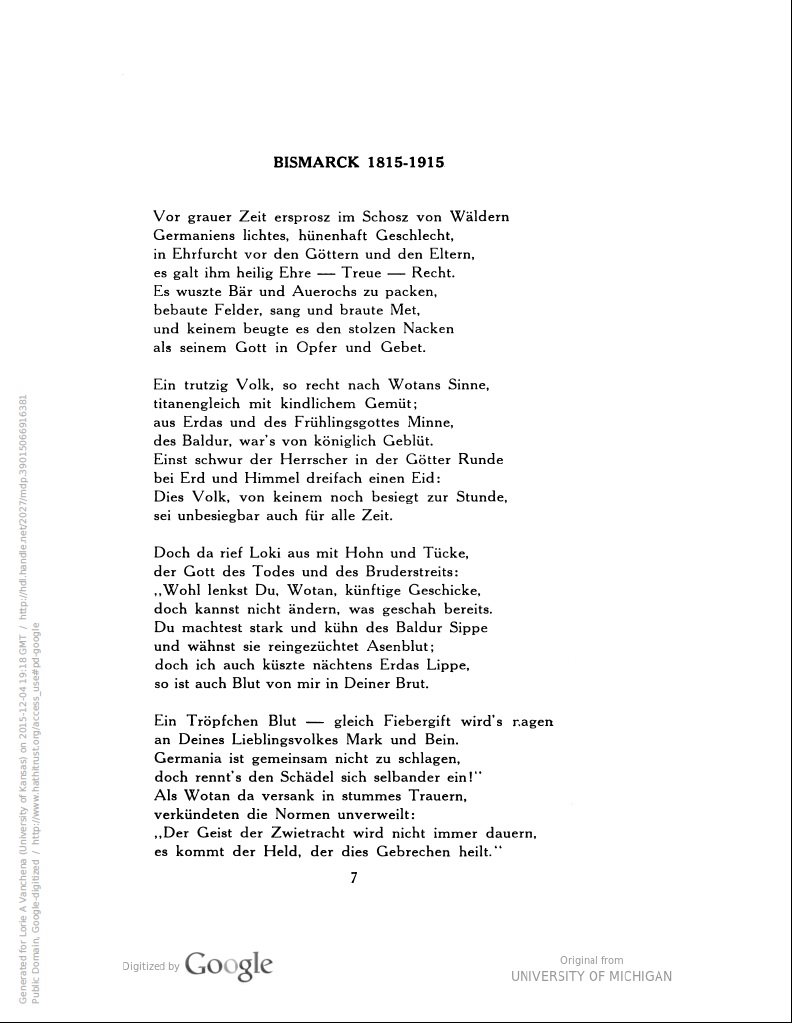WWI American
Immigrant Poetry

Vor grauer Zeit ersprosz im Schosz von Wäldern
Germaniens lichtes, hünenhaft Geschlecht,
in Ehrfurcht vor den Göttern und den Eltern,
es galt ihm heilig Ehre — Treue — Recht.
Es wuszte Bär und Auerochs zu packen,
bebaute Felder, sang und braute Met,
und keinem beugte es den stolzen Nacken
als seinem Gott in Opfer und Gebet.
Ein trutzig Volk, so recht nach Wotans Sinne,
titanengleich mit kindlichem Gemüt;
aus Erdas und des Frühlingsgottes Minne,
des Baldur, war’s von königlich Geblüt.
Einst schwur der Herrscher in der Götter Runde
bei Erd und Himmel dreifach einen Eid:
Dies Volk, von keinem noch besiegt zur Stunde,
sei unbesiegbar auch für alle Zeit.
Doch da rief Loki aus mit Hohn und Tücke,
der Gott des Todes und des Bruderstreits:
„Wohl lenkst Du, Wotan, künftige Geschicke,
doch kannst nicht ändern, was geschah bereits.
Du machtest stark und kühn des Baldur Sippe
und wähnst sie reingezüchtet Asenblut;
doch ich auch küszte nächtens Erdas Lippe,
so ist auch Blut von mir in Deiner Brut.
Ein Tröpfchen Blut — gleich Fiebergift wird’s nagen
an Deines Lieblingsvolkes Mark und Bein.
Germania ist gemeinsam nicht zu schlagen,
doch rennt’s den Schädel sich selbander ein!“
Als Wotan da versank in stummes Trauern,
verkündeten die Normen unverweilt:
„Der Geist der Zwietracht wird nicht immer dauern,
es kommt der Held, der dies Gebrechen heilt.“
So kamen die Jahrhunderte und gingen,
sahn Völker blühen, schwinden und erstehn.
sahn die Germanen Herrliches vollbringen
und sahen es in Trümmer wieder gehn.
Die Römer spürten der Teutonen Streiche,
doch Stammeszwist vereitelt’ vollen Sieg.
Den stolzen Bau von Karls des Groszen Reiche
zerstückelte der Enkel Bruderkrieg.
Und dreiszig Jahr’ verheerte Brand und Morden
das hundertfach zerriszne deutsche Land,
auch konnt’s nicht einen, noch nicht reif geworden,
des groszen Friedrich geniale Hand.
Vom grimmen Korsen in den Staub gerungen
schrie laut es auf — nach Einigkeit ein Schrei,
doch er verklang, als dieses Joch bezwungen
in kunterbunt Kleinstaaterei.
Da kam der Held, von dem die Sage kündet,
so frühlingsstark, titanenhaft an Geist.
Er fand das Wort, das deutsche Art verbindet,
er wuszt die Tat, die all das Stückwerk schweiszt.
Aus Blut und Eisen wuszte er zu kitten
ein Bruderband, vor jedem Sturm gefeit,
und all die Feinde, die dagegen stritten,
zerschmetterten an deutscher Einigkeit.
Er war ein Mann, urdeutsch bis in die Knochen,
ders Vaterland all über alles stellt’,
der von sich selbst, von deutscher Art gesprochen:
„Wir fürchten Gott, sonst nichts auf dieser Welt“.
Sein hoher Geist hielt all die Kleinen nieder,
die Zagen risz empor sein Adlerflug,
und aus Parteien ward ein Volk der Brüder,
das waffenfroh die Schlacht von Sedan schlug.
So ward das Reich, das deutsche, herrlich-neue,
wie’s Barbarossa schöner nicht ersann,
ein einig Volk, das Ehre, Recht und Treue
bewahrt und schützt als seinen Talisman.
Ein Reich und Volk, vor dem die Feinde zittern,
das in sich trägt der schönsten Zukunft Saat,
weil Zwist und Hader es nicht mehr zersplittern:
Und das war Bismarcks grosze Schöpfertat.
Er ging von uns, doch kann sein Geist nicht sterben;
sein Feuer brennt, durchglüht und stählt die Schar,
die Kopf an Kopf, der Väter treue Erben,
verteidigt heut des Vaterlands Altar.
Geist Bismarcks, Geist der Einheit und der Stärke,
bleib Schutzgeist deutschen Landen, deutschem Schlag,
dann blüht uns bald die Krönung Deiner Werke:
Der gröszte Sieges-, gröszte Friedenstag!
Hermann Brandau